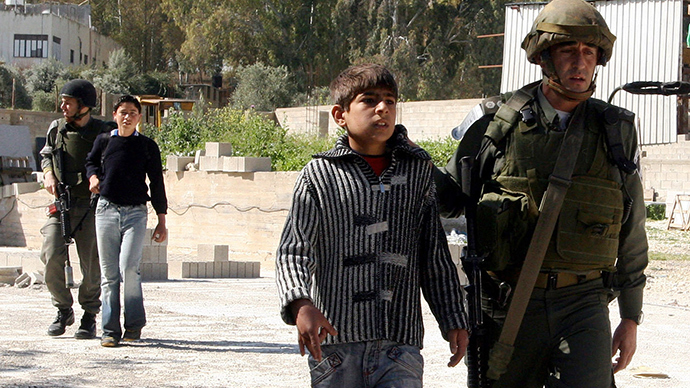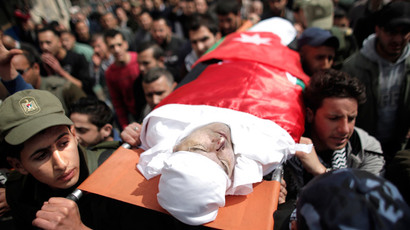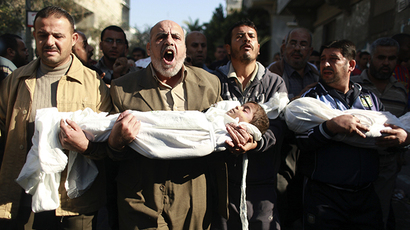'Blindfolded & bound': Israel puts more Palestinian kids in solitary confinement

Israel is placing more and more Palestinian children in solitary confinement as part of the interrogation process, a new study reveals. The children are often blindfolded, bound and sleep deprived. Neither they nor parents know the reasons for arrest.
“Solitary confinement for detained Palestinian children was
used in 21.4 percent of cases in 2013,” says the report released by Defense for Children
International Palestine (DCI-Palestine), a national section of
the international non-governmental child rights organization and
movement. The numbers have shown a 2-percent rise since 2012.
The organization took at least 98 sworn affidavits from
Palestinian children between the ages of 12 to 17 in 2013 and
submitted the information to UN bodies.
“The average number of Palestinian children in Israeli
military detention at the end of each month during 2013 was
199,” says the organization which took the data from the
Israeli Prison Service (IPS) and from Israeli army temporary
detention facilities, including Petah Tikva detention center,
Kishon detention center and Shikma prison in Ashkelon which lead
the interrogations.
According to the report, detained children spent an average of 10
days of isolation, with the longest period being 28 days. It also
adds that about 32 children between 12 and 15 years old were
arrested at the end of each month in 2013. The highest number of
detained teens of this age was in May, at 48.

In 34 out of 40 cases (85 percent), the children are detained
“during the middle of the night by heavily-armed Israeli
soldiers“ while in 38 out of 40 cases (95 percent), neither
the parents nor the child were told the reasons for arrest, says
the study.
Also about 76.5 percent of Palestinian children taken by Israeli
troops in West Bank suffered from certain form of violence during
arrest, transfer or interrogation in 2013, says the report.
“Children arrive at Israeli interrogation centers
blindfolded, bound and sleep deprived,” says the study.
“Interrogations tend to be coercive, including a variety of
verbal abuse, threats and physical violence that ultimately
result in a confession.”
In 2013, in at least 96 percent of cases DCI-Palestine documented
that the children “were questioned alone and rarely informed
of their rights.” The children were also interrogated
“without the benefit of legal advice, or being properly
informed of their right to silence.”
The interrogation techniques are usually both mental and
physical, including “intimidation, threats and physical
violence with a clear purpose of obtaining a confession… and/or
gather intelligence or information on other individuals.”
“The use of isolation against Palestinian children as an
interrogation tool is a growing trend,” said Ayed Abu
Eqtaish, Accountability Program director at DCI-Palestine.
“This is a violation of children’s rights and the
international community must demand justice and
accountability.”

The majority of Palestinian children are accused of throwing
stones, charges that may lead to up to 20 years imprisonment,
depending on a child’s age, according to an Israeli Military
Order.
“Although many children maintain their innocence, most plead
guilty because this is the quickest way out of a system that
rarely grants bail,” adds the study.
After the sentence, from 50 to 60 percent of child detainees from
Palestine are transferred to prisons inside Israel. This move is
a clear violation of Article 76 of the Fourth Geneva Convention,
adds the document.
DCI-Palestine urges to recognize using solitary confinement on
children in Israeli detention facilities as a form of torture
which should be stopped immediately.
“Israeli authorities must implement effective accountability
measures to ensure all credible reports of torture and
ill-treatment are impartially investigated and perpetrators are
held accountable,” says the report.
DCI-Palestine has already issued at least 15 complaints
concerning ill-treatment and violence towards 10 Palestinian
children detained by the Israeli military in 2013. However, no
indictment has been launched against the offenders yet.
DCI-Palestine, which has been investigating the human rights of
Children in Palestine since 1967, says that “each year
approximately 500-700 Palestinian children from the occupied West
Bank, some as young as 12 years old, are detained and imprisoned
in the Israeli military detention system, where ill-treatment of
children is widespread and systematic.”
“Palestinian child detainees are then prosecuted in Israeli
military courts that lack fundamental fair trial guarantees and
are not designed or administered to respect children’s
rights,” says the report.
Also, according to the study since 2000, “about 8,000
Palestinian children have been detained and prosecuted in the
Israeli military court system.”
“The practice of using solitary confinement on children in
Israeli military detention, whether in pretrial detention for
interrogation purposes or as a form of punishment, must be
stopped immediately and the prohibition must be enshrined in
law,” says the DCI in conclusion.
196 Palestinian kids imprisoned & prosecuted in #Israeli military court system at end of April http://t.co/sLwJUBJZR1pic.twitter.com/O4Dppy9nyL
— Defence for Children (@DCIPalestine) May 12, 2014
The Israeli military detention system has been often criticized
by Palestine as well as the world organizations, including the UN
and UNICEF, for ill-treatment of Palestinian children.
In April, the Palestinian Authority's minister of social affairs,
Kamal Sharafi, said at least 1,520 Palestinian children died at
the hands of Israeli forces since 2000. He also added that about
6,000 have been injured and more than 10,000 arrested.
In June 2013, the UN Committee on the Rights of the Child (CRC)
issued a report stating that thousands of Palestinian children
were systematically injured, tortured and used as human shields
by Israel.
During the 10-year period examined by UN human rights experts, up
to 7,000 children aged nine to 17 were arrested, interrogated and
kept captive, CRC said in the report.













